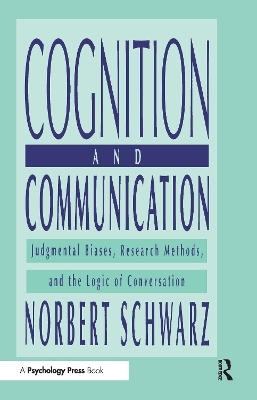
Cognition and Communication
Judgmental Biases, Research Methods, and the Logic of Conversation
Seiten
1996
Psychology Press (Verlag)
978-0-8058-2314-1 (ISBN)
Psychology Press (Verlag)
978-0-8058-2314-1 (ISBN)
This text introduces the "logic of conversation" developed by Paul Grice, who proposed the cooperative principle and a set of maxims on which conversationalists rely. This framework is applied to topics including: research on person perception; decision making; and public opinion research.
Psychological research into human cognition and judgment reveals a wide range of biases and shortcomings. Whether we form impressions of other people, recall episodes from memory, report our attitudes in an opinion poll, or make important decisions, we often get it wrong. The errors made are not trivial and often seem to violate common sense and basic logic. A closer look at the underlying processes, however, suggests that many of the well known fallacies do not necessarily reflect inherent shortcomings of human judgment. Rather, they partially reflect that research participants bring the tacit assumptions that govern the conduct of conversation in daily life to the research situation. According to these assumptions, communicated information comes with a guarantee of relevance and listeners are entitled to assume that the speaker tries to be informative, truthful, relevant, and clear. Moreover, listeners interpret the speakers' utterances on the assumption that they are trying to live up to these ideals.
This book introduces social science researchers to the "logic of conversation" developed by Paul Grice, a philosopher of language, who proposed the cooperative principle and a set of maxims on which conversationalists implicitly rely. The author applies this framework to a wide range of topics, including research on person perception, decision making, and the emergence of context effects in attitude measurement and public opinion research. Experimental studies reveal that the biases generally seen in such research are, in part, a function of violations of Gricean conversational norms. The author discusses implications for the design of experiments and questionnaires and addresses the socially contextualized nature of human judgment.
Psychological research into human cognition and judgment reveals a wide range of biases and shortcomings. Whether we form impressions of other people, recall episodes from memory, report our attitudes in an opinion poll, or make important decisions, we often get it wrong. The errors made are not trivial and often seem to violate common sense and basic logic. A closer look at the underlying processes, however, suggests that many of the well known fallacies do not necessarily reflect inherent shortcomings of human judgment. Rather, they partially reflect that research participants bring the tacit assumptions that govern the conduct of conversation in daily life to the research situation. According to these assumptions, communicated information comes with a guarantee of relevance and listeners are entitled to assume that the speaker tries to be informative, truthful, relevant, and clear. Moreover, listeners interpret the speakers' utterances on the assumption that they are trying to live up to these ideals.
This book introduces social science researchers to the "logic of conversation" developed by Paul Grice, a philosopher of language, who proposed the cooperative principle and a set of maxims on which conversationalists implicitly rely. The author applies this framework to a wide range of topics, including research on person perception, decision making, and the emergence of context effects in attitude measurement and public opinion research. Experimental studies reveal that the biases generally seen in such research are, in part, a function of violations of Gricean conversational norms. The author discusses implications for the design of experiments and questionnaires and addresses the socially contextualized nature of human judgment.
Norbert Schwarz
Contents: Cognition, Communication, and the Fallacies of Human Judgment. Cognition and Communication: The Logic of Conversation. The Conversational Relevance of "Irrelevant" Information. Questions, Innuendos, and Assertions of the Obvious. The Conversational Relevance of Formal Features of Questionnaires. Making One's Contribution Informative: The Changing Meaning of Repeated Questions. Judgment in a Social Context: (Some) Conclusions.
| Erscheint lt. Verlag | 9.5.2007 |
|---|---|
| Reihe/Serie | Distinguished Lecture Series |
| Verlagsort | Philadelphia |
| Sprache | englisch |
| Maße | 152 x 229 mm |
| Gewicht | 294 g |
| Themenwelt | Geisteswissenschaften ► Philosophie ► Sprachphilosophie |
| Geisteswissenschaften ► Psychologie ► Allgemeine Psychologie | |
| Geisteswissenschaften ► Psychologie ► Verhaltenstherapie | |
| Geisteswissenschaften ► Sprach- / Literaturwissenschaft ► Sprachwissenschaft | |
| Mathematik / Informatik ► Informatik ► Theorie / Studium | |
| Sozialwissenschaften ► Soziologie | |
| ISBN-10 | 0-8058-2314-X / 080582314X |
| ISBN-13 | 978-0-8058-2314-1 / 9780805823141 |
| Zustand | Neuware |
| Haben Sie eine Frage zum Produkt? |
Mehr entdecken
aus dem Bereich
aus dem Bereich
Macht und Legitimität politischer Sprache im Prozess der europäischen …
Buch | Softcover (2023)
Nomos (Verlag)
74,00 €
KI, Kreativität und algorithmische Postrationalität
Buch | Softcover (2024)
Matthes & Seitz Berlin (Verlag)
16,00 €
Wie die Menschheit zu ihrer größten Erfindung kam
Buch | Softcover (2022)
C.H.Beck (Verlag)
18,00 €


